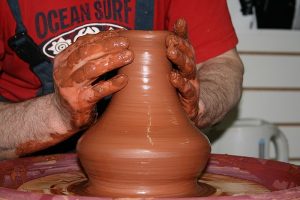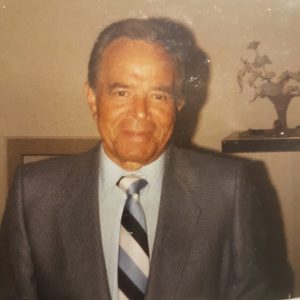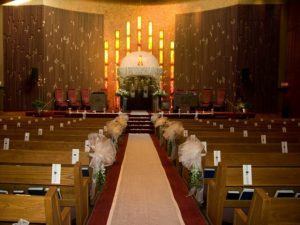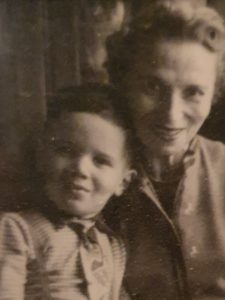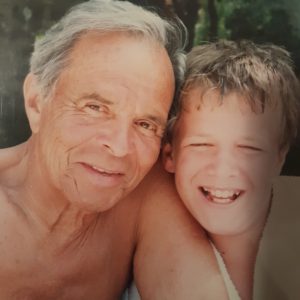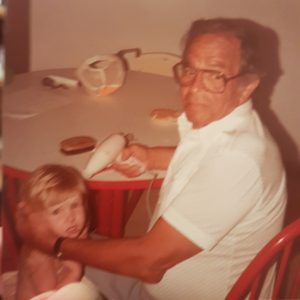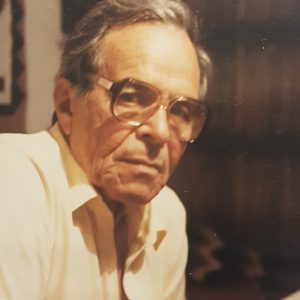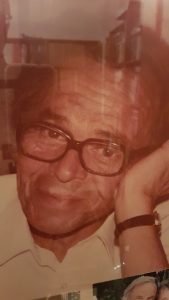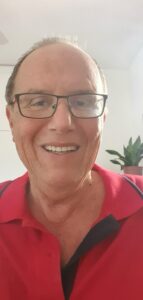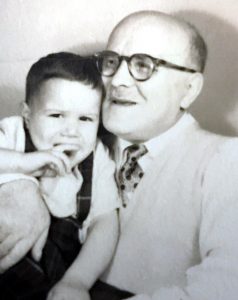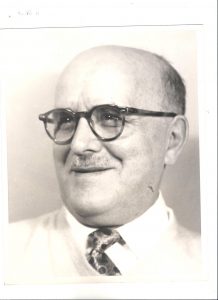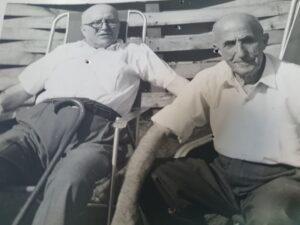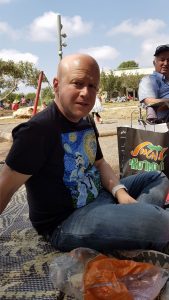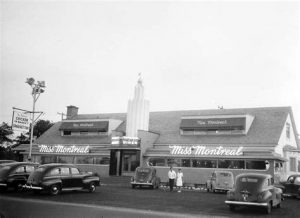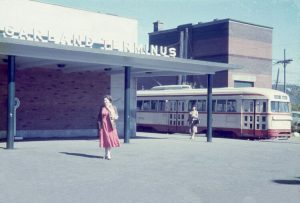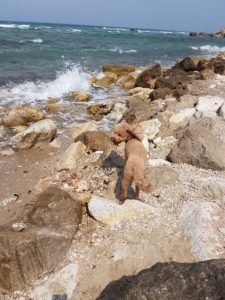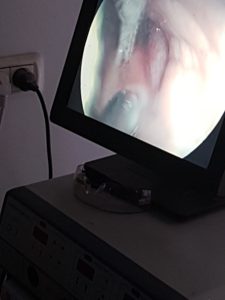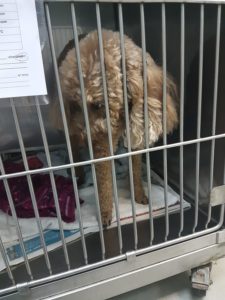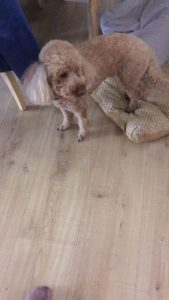In late September or early October every year, Dad would inevitably take me to synagogue for Yom Kippur, the Day of Atonement. This was in spite the fact that he sent me to a Protestant school and our home was totally, I mean totally, non observant.
There were three trips (by car) back and forth to synagogue on that day. The eve of Yom Kippur for Kol Nidre (All our vows) -the next morning from 1000 till about noon, and then at 500 PM for Neila (closing of the sky when one’s fate is sealed), which my Dad called the ‘final stretch’.
Now we lived in Ville St Laurent where there was a synagogue but it was too ‘orthodox’ for my Dad, so we drove to the Town of Mount Royal, aka TMR, to Beth El Synagogue on 1000 rue Lucerne. We parked quite a distance away and then pretended to walk to synagogue, because you are not supposed to drive, not only fast.
The rabbi, Allan Langer, would often comment that it was ‘so nice to see so many people’, or say something like ‘lots a faces I remember from last year’, alluding to the fact that no one attended during services during the year. My Dad would mumble that ‘that’s a snide f–king comment’. I reminded Dad that he was in a synagogue, and he reminded me to ‘remember who I was talking to’, in good humour.
The prayers included long lists of sins for which we need to repent…sins committed willingly and unwillingly, sins of the flesh, of the bottle, or usury, what have you. As we read this list of sins in unison, my Dad would comment that ‘they are throwing the whole God damned book at me’. I told Dad that he could skip over a few if he was innocent, but he insisted on going thru all of them. I would ask him if smoking was a sin, and he told me to ‘shut up and pray’.
Every hour or so, Dad would go out for a smoke, hiding in an alley or a sidestreet. He would tell me that if the rabbi asks where he is, ‘cover for me’.
When Cantor Willy Finer got on the podium to sing, it was a different story. Willy and Dad were in the Royal Canadian Air Force together, and Dad told me to show respect, ‘and I’m not kidding’. There was no good humour in that. Dad and Cantor Willy often traded off colour jokes or reminisced about world war two. When Willy died, Dad cried.
Dad had interesting observations during the service. ‘See that guy three rows ahead, the blond guy. He’s with the mob. What the hell is he doing here every year’? Or ‘hear that guy in the back row on the right, he comes from a very observant background, but when his old man dies, he’ll be outta here like a bat out of hell’.
During Yom Kippur services, one must rise and sit down very often. The rabbi calls out ‘all rise’ then you ‘may be seated’. Often it’s an up and down game. My Dad used to tell me that the rabbi should ‘make up his —–g mind’.
During Yom Kippur, my Dad would not answer the question if he ate or not. I knew that he ate by the sound of the fridge opening and closing which I heard from my room, I would ask ‘who’s in the kitchen, is that you Dad?’ And there was never an answer.
As a kid, I tried to fast a few times, but it was hard. Then I fasted from the age of 18 till I was 38, when my wife got sick. I have not fasted since then, and I am soon to be 71.
The only prayer that I really loved was “As raw material in the hand of a craftsman”, a line of which is the tile of this post.
One of Dad’s challenges on Yom Kippur was knowing what the football score was. My Dad was a professional football player for two years, so he used to bring along a transistor radio, and tell me to “go out and get the latest score”.
For years and years, Yom Kippur is just another day and I have no regrets whatsoever about this. But I do miss Dad and his ambivalent relationship with tradition, which I admit rubbed off on me.
כִּי הִנֵּה כַּחֹמֶר בְּיַד הַיּוֹצֵר
בִּרְצוֹתוֹ מַרְחִיב וּבִרְצוֹתוֹ מְקַצֵּר
כֵּן אֲנַחְנוּ בְיָדְךָ חֶסֶד נוֹצֵר
לַבְּרִית הַבֵּט וְאַל תֵּפֶן לַיֵּצֶר
כִּי הִנֵּה כָּאֶבֶן בְּיַד הַמְסַתֵּת
בִּרְצוֹתוֹ אוֹחֵז וּבִרְצוֹתוֹ מְכַתֵּת
כֵּן אֲנַחְנוּ בְיָדְךָ מְחַיֶּה וּמְמוֹתֵת
לַבְּרִית הַבֵּט וְאַל תֵּפֶן לַיֵּצֶר
כִּי הִנֵּה כַּגַּרְזֶן בְּיַד הֶחָרָשׁ
בִּרְצוֹתוֹ דִּבֵּק לָאוּר וּבִרְצוֹתוֹ פֵּרַשׁ
כֵּן אֲנַחְנוּ בְיָדְךָ תּוֹמֵךְ עָנִי וָרָשׁ
לַבְּרִית הַבֵּט וְאַל תֵּפֶן לַיֵּצֶר
כִּי הִנֵּה כַּהֶגֶה בְּיַד הַמַּלָּח
בִּרְצוֹתוֹ אוֹחֵז וּבִרְצוֹתוֹ שִׁלַּח
כֵּן אֲנַחְנוּ בְיָדְךָ אֵל טוֹב וְסַלָּח
לַבְּרִית הַבֵּט וְאַל תֵּפֶן לַיֵּצֶר
כִּי הִנֵּה כִּזְכוּכִית בְּיַד הַמְזַגֵּג
בִּרְצוֹתוֹ חוֹגֵג וּבִרְצוֹתוֹ מְמוֹגֵג
כֵּן אֲנַחְנוּ בְיָדְךָ מַעֲבִיר זָדוֹן וְשׁוֹגֵג
לַבְּרִית הַבֵּט וְאַל תֵּפֶן לַיֵּצֶר
כִּי הִנֵּה כַּיְרִיעָה בְּיַד הָרוֹקֵם
בִּרְצוֹתוֹ מְיַשֵּׁר וּבִרְצוֹתוֹ מְעַקֵּם
כֵּן אֲנַחְנוּ בְיָדְךָ אֵל קַנֹּא וְנוֹקֵם
לַבְּרִית הַבֵּט וְאַל תֵּפֶן לַיֵּצֶר
כִּי הִנֵּה כַּכֶּסֶף בְּיַד הַצּוֹרֵף
בִּרְצוֹתוֹ מְסַגְסֵג וּבִרְצוֹתוֹ מְצָרֵף
כֵּן אֲנַחְנוּ בְיָדְךָ מַמְצִיא לְמָזוֹר תֶּרֶף
לַבְּרִית הַבֵּט וְאַל תֵּפֶן לַיֵּצֶר.
Like the clay in the hand of the potter-
he expands it at will and contracts it at will-
so are we in Your hand, O Preserver of kindness,
look at the covenant and show thy mercy.
Like the stone in the hand of the cutter-
he grasps it at will and smashes it at will-
so are we in Your hand, O Source of life and death,
look to the covenant and show thy mercy.
Like the ax-head in the hand of the blacksmith-
he forges it at will and removes it at will-
so are we in Your hand,
O Supporter of poor and destitute,
look at the covenant and show thy mercy.
Like the anchor in the hand of the sailor-
he holds it at will and casts it at will-
so are we in Your hand,
O good and forgiving God,
look to the covenant and show thy mercy.
Like the glass in the hand of the blower-
he shapes it at will and dissolves it at will-
so are we in Your hand,
O Forgiver of willful sins and errors,
look to the covenant and show thy mercy.
Like the curtain in the hand of the embroiderer-
he makes it even at will and makes it uneven at will-
so are we in Your hand,
O jealous and vengeful God,
look to the covenant and show thy mercy.
Like the silver in the hands of the silversmith-
he adulterates it at will and purifies it at will-
so are we in Your hand,
O Creator of cure for disease,
look to the covenant and show thy mercy.

